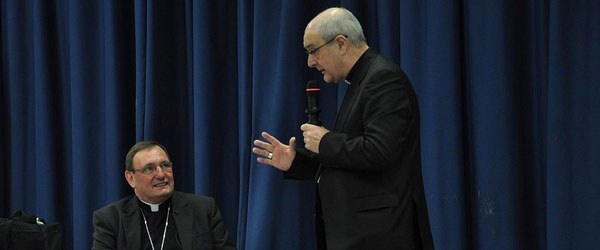
Msgr. Laffitte is welcomed by the Auxiliary Bishop of the Diocese of Westminster, H.E. Msgr. Alan Stephen Hopes, on the occasion of his lecture, on March 9th, 2013, in Student Union Hall at St Mary's University College in Twickenham (United Kingdom) on “Marriage and the Family in a Culture of Relativism”, promoted by Professor Edmund Adamus, Director of the Marriage and Family Life Commission of the Diocese of Westminster.
Msgr. Laffitte analyzed in great detail the-present-day context of relativism, before developing more fully the theme of the family and marriage in today's world.The cultural context is that of «a moral liberalism based on a perspective of absolute freedom, unlimited freedom» for which «well-being is understood mainly in a hedonistic sense».
«The spread of new cultural models is accompanied by new moral criteria. This is so especially among young people, with a new conception of interpersonal relationships, the value and practice of sexuality and the very concept of human life. Any reference to natural law is abolished and banned ». Among the effects of this cultural shift, there is without a doubt «the loss of human and Christian hope, in human love. Sentimental unions are not necessarily based on a formalized relationship and a project for life». This is, consequently, the priority of pastoral commitment: «the perception the value of the indissolubility of the conjugal union is gradually being lost. Young people no longer see the difference between a good marriage that lasts forever, that is lifelong, unto death, and a marriage that lasts as long as possible». The prevailing cultural model is that of unions with limited duration.
«In order to restore hope to young people, we have to make them understand that indissolubility is an essential part of the love between a man and a woman united in marriage, and that it is an intrinsic quality of this love».
Another element of pastoral care concerns «openness to life to which married couples are called». Sexuality is experienced as mutual communion and total self-giving between the spouses, as part of a family project that is not locked in the private sphere, but it presupposes a vision of society in which the family forms itself and develops.